How to install the mixer on the sink: a detailed analysis of installation technology
If you want to replace the faucet in the bathroom or in the kitchen, but there is no experience in performing such work, do not despair. This does not mean that the task is impossible and you have to call plumbing. It is enough to carefully study the manual and carefully follow all the requirements of the instructions. Do you agree?
We will tell you in detail how to install the mixer on the sink. Here you will find out what technological features must be observed when installing the device, what types of sinks are installed. The article also lists common mistakes that are undesirable for the home master.
The content of the article:
Mixer installation: parsing technology
Almost every adult male is able to complete the installation of the mixer at home. It’s just that there’s not always a similar experience behind, and it’s sometimes awkward to ask more experienced colleagues.
A detailed installation process will come to the rescue, which will save you from many questions and give you confidence in your own strength - it’s quite easy to cope with the installation of the mixer.
How to prepare for installation?
Before you do the installation directly, you have to go through the preparatory phase. First you need to carefully examine the sink, if it is already installed in the bathroom. If this is a kitchen sink, then it still remains to be explored. Primarily interested in the number of holes provided by the manufacturer for the future mixer.
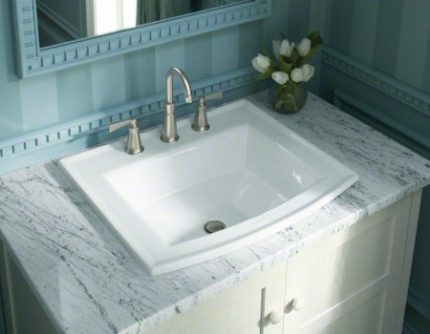
Often, the manufacturer completes the original bowl of the sink with a mixer with all the parts necessary for installation. But this is only possible in expensive models, where all the elements of plumbing are decorated in the same style.
It is important when buying a mixer to check whether all parts are included.After all, installation will require nuts, gaskets, flexible or rigid eyeliner. The presence of all components should be paid attention to before purchasing the product.
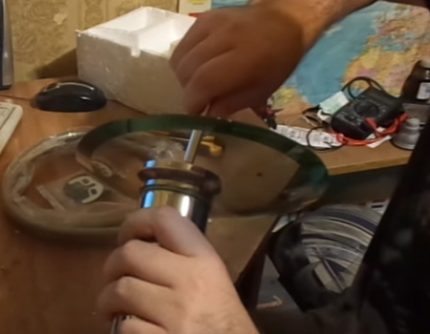
When the mixer of the desired model and size is purchased, the instructions are studied, it remains to install it. To do this, you will need tools that it is advisable to prepare before starting work.
These are wrenches and adjustable wrenches, sealing tape, masking tape, a small wrench, a screwdriver, pliers, a flashlight, a plumbing kit for the mixer with all the accessories, a piece of soft cloth.
You may need to buy an extra 2 hoses flexible eyelinerif the length of the tubes coming with the mixer is insufficient. And you will also need a hacksaw for metal, if you have to install a model with bottom valvehaving mechanical adjustment.
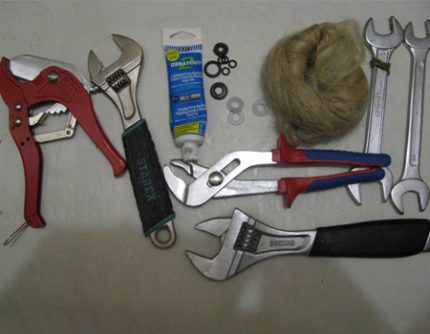
If the bathroom was already in use, then most likely you will first have to remove the old faucet. It is important to do everything extremely carefully so as not to damage the sink if it is not planned to replace it. It is better to lay a piece of soft cloth at the bottom of the container to avoid accidental chips and scratches.
Then you need to turn off the taps for supplying water to the mixer. If there are none, then you have to block the water in the entire apartment / house. Then you need to check this by opening the mixer - if nothing drips, then you can proceed to dismantle.
If you plan a complete change of the plumbing kit, then, of course, first produced sink installation. Then you will need to shut off the water supply and lay a soft cloth on the front of the container to protect against accidental damage.
Installation Technology Description
If the preparatory work is carried out correctly, then installing the mixer on a ceramic sink will not take much time - on average it will take about 30 minutes. This is provided that the instructions that come with the kit are read and the mixer itself is assembled.
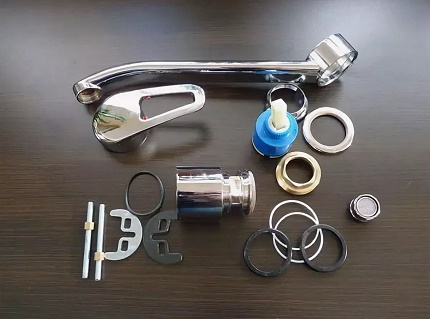
It is easiest to install the mixer on a ceramic sink if it is not already fixed at its workplace. When this is not possible, installation may be a little difficult and you will need a flashlight. In places that are difficult to reach, you will have to flash a flashlight - an assistant will be required here.
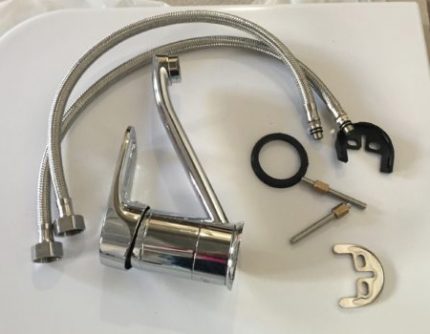
In order to attach the mixer to the sink, you need:
- Use a 10 or 11 wrench to screw the flexible eyeliner to the mixer. You can use a flexible corrugated stainless steel tube.
- Place rubber or silicone gasket on tap base.
- Screw in 2 studs with a key or by hand in turn. If the model comes with a sleeve, then no studs will have to be set.
- Thread the flexible hoses into the hole in the sink.
- Fit a horseshoe-shaped mounting piece from below.
- Put a metal washer of the same shape on top of the gasket.
- To fix on each of two hairpins on a union nut, having tightened with an adjustable or wrench for reliability.
When tightening the nuts, it is important not to overdo it - the connection may break and will leak water. If the nuts are loosened tightly, the fastener will hang out and the faucet on the sink will later dance from side to side.
It is important when tightening the nuts to wrap the outer part of the mixer with masking tape so as not to scratch the decorative coating during work. Also, a piece of soft cloth should be put in the sink to avoid accidental damage to the surface.
After reliable fixation of the mixer on the side, you have to connect it to the water supply network. For this you need loose ends flexible or hard eyeliner attach to the water pipes, fixing all with nuts.
A sealing tape may be needed here to make the connection airtight. For a stronger connection, you can use an adjustable wrench.
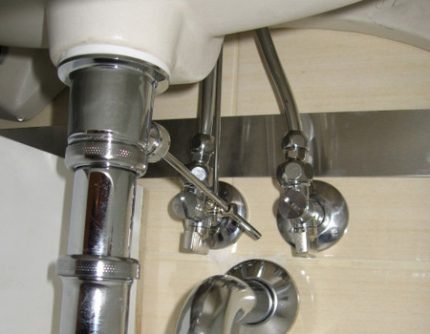
Of great importance is the length of the eyeliner - it must be correct. Too long a tube will interfere and can twist several times, which will reduce its service life. If it is short, then it is better to replace it immediately, rather than build up. You can use a rigid eyeliner, but it is more difficult, because the exact dimensions are important here.
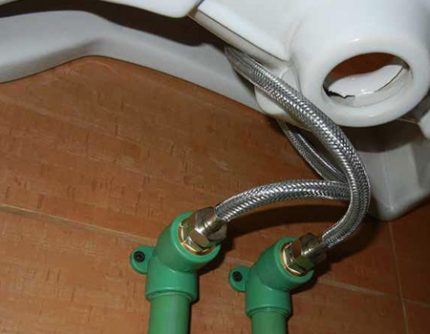
The final stage of installation
It remains to put a siphon on the sink, and if necessary, then the bottom valve - depending on which model is used. There are mixers that come with a bottom valve with mechanical adjustment. Here, after clarifying the required length, you have to use a hacksaw to cut off the excess.
To put a siphon on the sink, you will need to assemble it, following the instructions. Then put on the lower part, pre-installing the gasket. A gasket and a stainless release with a screw are to be put in the outlet of the sink. This screw must be tightened tightly with a screwdriver - it connects the siphon to the sink.
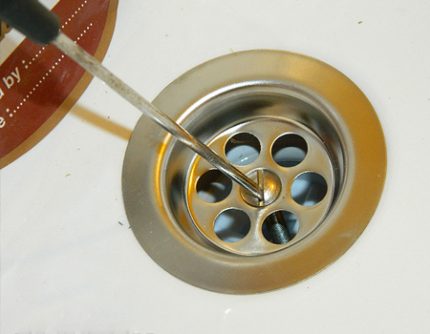
It remains to connect to the sewage system. To do this, a corrugation is connected to the siphon, on the reverse end of which an adapter is put on, connecting the entire structure to the sewer pipe.
Now it’s time to check the system’s health. To do this, open the water supply to the apartment / house and open the tap. If water flows, then the tap is installed correctly. It remains to examine all the connections so that nothing drips anywhere. If everything is in order, then we managed to cope with the work "perfectly".
Nuances of installing a mixer
With the installation of the faucet on ceramics, everything is clear, but questions may arise when the sink is made of another material. There are small nuances with which we will now take a closer look.
If a stainless steel sink
The most important thing in installing a mixer is to choose the right model and correctly complete each stage of the work. This is not difficult, but requires attention and calm. If the sink is stainless steel, then you need to choose a mixer of suitable design, size and shape.
And most often, stainless steel is used to make a kitchen sink - it is a durable material. It is more convenient to mount the mixer in a stainless steel when it is not installed in the workplace.
If there is no way to remove the sink, you have to enlist the help of a friend, son, wife or other person. After all, the conditions in which the stainless steel sink is located are very cramped. Therefore, without an assistant and a flashlight can not do.
The process of mounting the mixer on a stainless sink is similar to installing it on a ceramic sink. If there is no hole for the mixer, then it is easy to cut it with your own hands, treating the edges to make them smooth.
If the mixer is placed on overhead plumbing, it is first produced installation of the bidet or for the sink. Then a bowl of plumbing equipment is hung on this support frame, after which fittings designed to supply water to the consumer are connected directly.
If the glass sink
Often, glass products are used in the interior. They look especially stylish overhead sinks from this material. Moreover, they can be of different shapes, colors and sizes - it all depends on the flight of designer imagination.
There are no difficulties in installing the mixer on a glass sink. It is important to adhere to safety rules and choose the most suitable model.
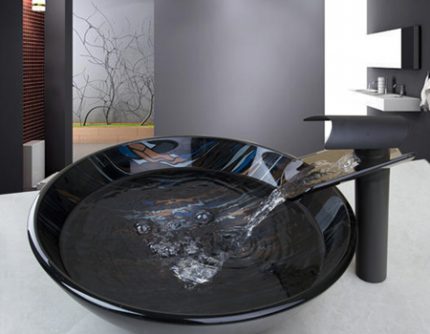
Installation is made on that surface in which the opening is provided. If this is a model mounted on a pedestal, the so-called tulip shell, then you have to work with this basis.
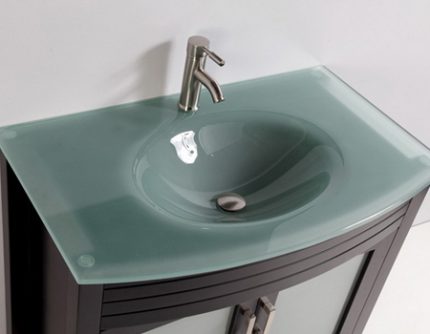
When working with glass, you should not rush - although it is heavy-duty, it can break when the hammer falls.
Other types of shell material
In addition to ceramics, glass and stainless steel, marble, porcelain, granite, plastic, acrylic and even wood are used for the production of sinks. Porcelain containers are quite expensive.
As for the installation, it is simple and depends on the type of mixer to be installed. To the purchased model is an instruction that details how to properly install.
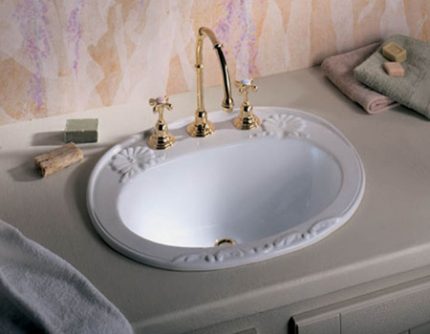
If the bathroom has a sink or a pedestal for a wooden sink, the installation of the mixer is not particularly difficult.The only thing is that this material is rather capricious and will simply not be able to serve for a long time. Most likely the tap will survive the sink.
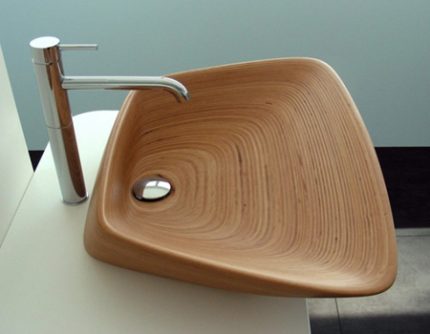
For marble, granite and acrylic, the installation technology of the mixer will be used, similar to the installation on a ceramic sink. It is important to assemble the mixer correctly, and in the process of tightening the fasteners, do not overtighten and carefully carry out the connection and sealing units.
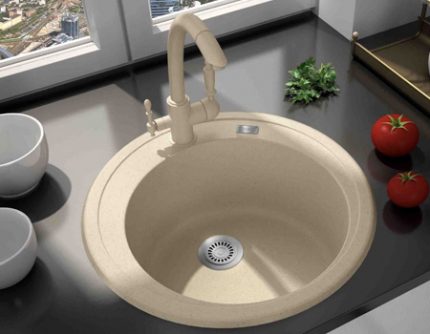
Installation errors
When the installation is done by an invited master who has remarkable experience, the result of his work will be excellent - he knows all the nuances for sure. But self-assembly does not exclude the occurrence of various troubles. Especially if such work is carried out for the first time in my life.
Firstly, after installation, you can find that the crane is dancing side to side or leaning sideways. This problem will not occur if, at the stage of its connection with the sink, the nut is carefully fixed. You also need to check the correct placement so that you do not have to redo the work.
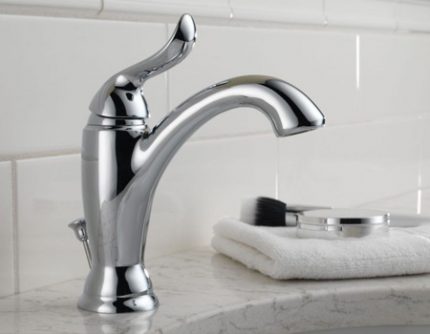
The second trouble is that when you turn on hot water, cold water flows and vice versa. This is also an easy fix.
Just at the stage of connecting the tap to the water supply, there was a mess with the pipes. It is necessary to shut off the supply of cold and hot water, disconnect the flexible eyeliner and, swapping the tubes, reconnect them.
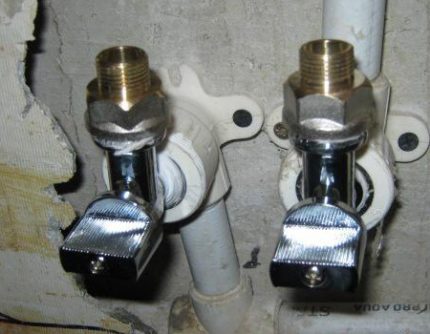
As a result, a flexible eyeliner with a red ribbon should connect to the pipe supplying hot water, and the tape, in the braid of which is blue, should be connected to the cold water pipe.
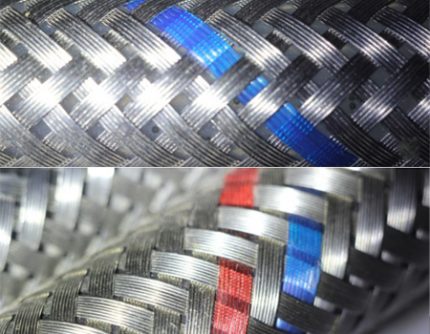
Thirdly, leaks may occur at the joints. This is the result of loosening the nut. Tighten it at the leak and look again. If the leak does not stop, then the reason may be in the nut itself - maybe it was pulled over and it burst. Will have to use a spare.
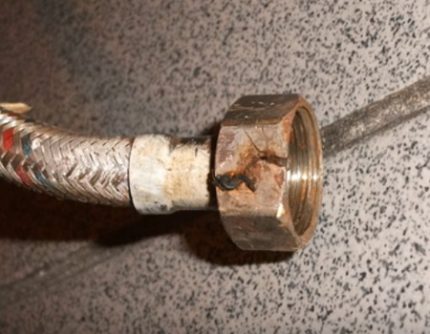
Fourth, flexible eyeliner can burst.
This happens if during installation one of the situations arose:
- the flexible tube was short and had to be pulled a little;
- attached too much eyeliner, it twisted and bent several times;
- liner made of technical rubber with an aluminum frame, and the connection point is hard to reach. She was sharply bent and broken;
Whatever the reason, it remains to be eliminated. It is bad when there is not enough length, but no less bad when this length is abundant.
It is right to choose the optimal eyeliner, taking into account the material - it is desirable that the rubber tube be made of food rubber, and the outer braid is made of stainless steel or galvanized.
With the rules for installing the mixer on the plumbing in the bathroom next article, the content of which we recommend to read.
Conclusions and useful video on the topic
Installing a mixer with a bottom valve has its own characteristics. How to do this correctly is described in the video:
If the length of the flexible eyeliner that comes with the mixer is short, you should buy a longer one. A video clip tells in detail about the nuances of these hoses and the selection rules:
It is convenient to install the mixer if the sink is not already installed. So there is comprehensive access when tightening various fasteners:
Even the original frap mixer must be carefully inspected and assembled before installation. And after completion of installation work, you should check its performance:
If everything is done correctly and slowly, then installing the mixer will be an interesting pastime. An independently completed work front will delight you with an excellent result, which is in no way inferior to the professional installation made by an experienced plumber.
It is important that everything is securely fixed, but without fanaticism - the fasteners do not like to be pulled.
Please write comments in the block below. Ask questions about controversial issues, share useful information on the selection and installation of a kitchen faucet. Perhaps you want to tell how you installed it yourself?

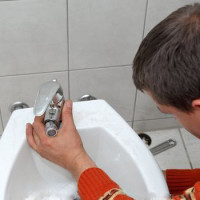 How to Install a Bidet Mixer: Installation and Connection Guide
How to Install a Bidet Mixer: Installation and Connection Guide 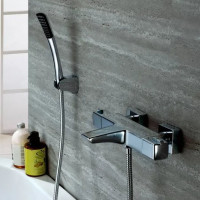 Thermostatic mixer: how to choose and install a mixer with thermostat
Thermostatic mixer: how to choose and install a mixer with thermostat 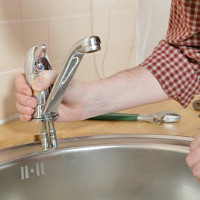 How to install a faucet in the kitchen: step-by-step instruction on the work
How to install a faucet in the kitchen: step-by-step instruction on the work 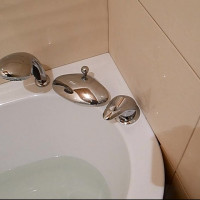 How to install the mixer on board the bath: step-by-step installation instructions
How to install the mixer on board the bath: step-by-step installation instructions 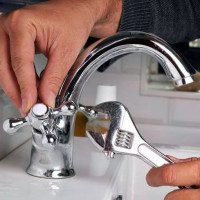 How to change the faucet in the kitchen: remove the old faucet and install a new
How to change the faucet in the kitchen: remove the old faucet and install a new 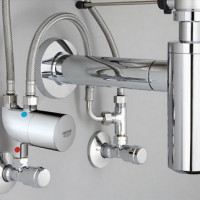 Flexible connection for the mixer: how to choose + install a bellows connection for water
Flexible connection for the mixer: how to choose + install a bellows connection for water 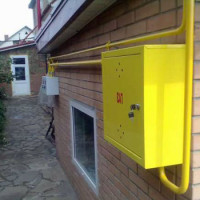 How much does it cost to connect gas to a private house: the price of organizing gas supply
How much does it cost to connect gas to a private house: the price of organizing gas supply  The best washing machines with dryer: model rating and customer tips
The best washing machines with dryer: model rating and customer tips  What is the color temperature of light and the nuances of choosing the temperature of the lamps to suit your needs
What is the color temperature of light and the nuances of choosing the temperature of the lamps to suit your needs 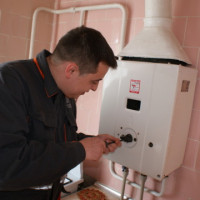 Replacement of a geyser in an apartment: replacement paperwork + basic norms and requirements
Replacement of a geyser in an apartment: replacement paperwork + basic norms and requirements
Here I was, mixed up the hoses of hot and cold water, then I wondered why, for no reason, the hot one had flowed from the cold water tap. Then I just realized, I had to rearrange. Now I’m more attentive to this. As for the mixers, there are so many things now, and the quality is poor. If earlier I knew that the more expensive you take, the longer it will last, but now the price is not an indicator of quality at all. Which is very disappointing. For the first six months I have been changing the second mixer.
Hello. Recently remarked such confusion in many homes. Strange, but even experienced masters are often confused.
If ease of use allows, simply change the icons on the 2 “lamb”, rather than change the entire supply. True, in thermo-mixers this is not permissible in all models, but in ordinary models it is. I suspect that the reason for the confusion sometimes arises due to Soviet standards for connecting hot water to the right.
The mixer installation process is so simple that anyone can handle it by watching a master class on YouTube. If it is placed in the hole on the sink, then this is quite elementary, but if the pipes are led out to the side so that you can turn the faucet to the bathtub, the technology is slightly different, but also simple. All you need is tools, a little physical strength and accuracy.